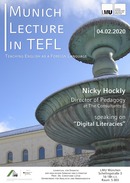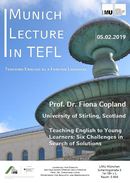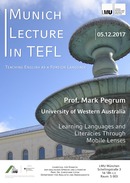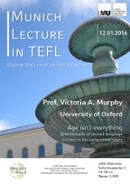Munich Lectures in TEFL
Lectures 2021-2024:
- Nicky Hockly (2020)
- Prof. Fiona Copland (2019)
- Prof. Mark Pegrum (2017)
- Prof. Victoria Murphy (2016)
Nicky Hockly
Munich Lecture in TEFL 2020
Link to Nicky Hockly's Munich Lecture in TEFL (Video Online: Unterrichtsmitschau LMU)
 Digital Literacies
Digital LiteraciesProf. Fiona Copland
Munich Lecture in TEFL 2019
 Teaching English to Young Learners: Six Challenges in Search of Solutions
Teaching English to Young Learners: Six Challenges in Search of SolutionsProf. Mark Pegrum
Munich Lecture in TEFL 2017
Link to Mark Pegrum's Munich Lecture in TEFL (Video Online: Unterrichtsmitschau LMU)

Learning Languages and Literacies through Mobile Lenses
The field of MALL, or Mobile-Assisted Language Learning, has developed based on the premise that mobile devices offer the potential to enhance language learning and literacy learning, as well as cultural exploration. But this potential can be realised in different ways and to different degrees: simply using mobile devices, in and of itself, is not sufficient. This presentation will examine a number of successful mobile language and literacy learning projects, seeking to determine the key factors that underpin their success.
It will be shown that with the emergence of a new generation of mobile context-aware technologies, we can build on the personalised and collaborative learning facilitated by web 2.0 and social media, but we can go much further. There are greater opportunities than ever before to foreground authentic learning in everyday contexts, while simultaneously heightening student engagement through gamified approaches. To capitalise on this potential, it is essential for educators to develop appropriate mobile learning designs.
Drawing on Pegrum's (2014) 3-Level Mobile Learning Framework, Burden & Kearney's (2017) Mobile Pedagogical Framework, and Clandfield & Hadfield's (2017) Weak & Strong Interaction Model, this presentation suggests that the optimal mobile learning designs should involve activities where the devices, the learners, and the learning experiences are all mobile; where the three dimensions of personalisation, collaboration, and authenticity are foregrounded; and where both weak and strong interaction are present.
The presentation goes on to illustrate the potential of mobile augmented reality (AR) language and literacy learning projects – in the form of games or gamified learning trails – most of which also incorporate elements of cultural exploration. After mentioning well-known North American and European examples, the presentation focuses on recent developments in gamified learning trails in the Asian region. It will include examples of projects from a range of countries such as Singapore, Indonesia and Hong Kong, where students learn collaboratively in real-world settings, while practising language, developing digital literacies and 21st century skills, and exploring culture.
In summary, the paper will demonstrate that with appropriate mobile learning designs, mobile devices can effectively become lenses on learning which open up a range of possibilities for personal, collaborative and authentic learning in everyday settings.
Biography: Prof. Mark Pegrum is from the University of Western Australia, where he works as an Associate Professor in the Faculty of Education. His research and teaching expertise lies mainly in the areas of e-learning, m-learning, digital literacies and the increasing integration of Web 2.0 and mobile technologies into everyday life. Mark Pegrum's publications include Brave New Classrooms: Democratic Education and the Internet (2007) and From Blogs to Bombs: The Future of Digital Technologies in Education (2009).
Prof. Victoria Murphy
Munich Lecture in TEFL 2016

Age isn't everything: Determinants of second language success in the early school years
Age is often considered the critical variable in determining the success of L2 learning, where the belief is that the younger the child, the more likely the success in foreign or L2 learning. In this presentation I will review some of the evidence that speaks to this issue, both in terms of why age is an important variable, and also why it is not the only, nor possibly the most important, variable. I will argue that age is but one variable that interacts with many other factors relating to pedagogy, materials and student-led variables (e.g. attitudes, motivation) that influence the effectiveness of L2 learning in classroombased contexts. These issues need to be considered within the specific contexts in which the young learner is acquiring the second or foreign language to precisely identify factors which determine successful L2 or foreign language outcomes.
Biography: Victoria Murphy is Professor of Applied Linguistics in the Department of Education, University of Oxford. Her research centres on child L2 and foreign language learning in primary school. She is the convener of the 'Research in English as an Additional Language (REAL)' Group. Her main focus of research is to examine the language and literacy development of EAL children, investigate factors influencing the success of child L2 learning and bilingualism, and to understand lexical development in both L1 and L2 learners. Victoria publishes widely in Applied Linguistics journals and has published two books on young language learners.

